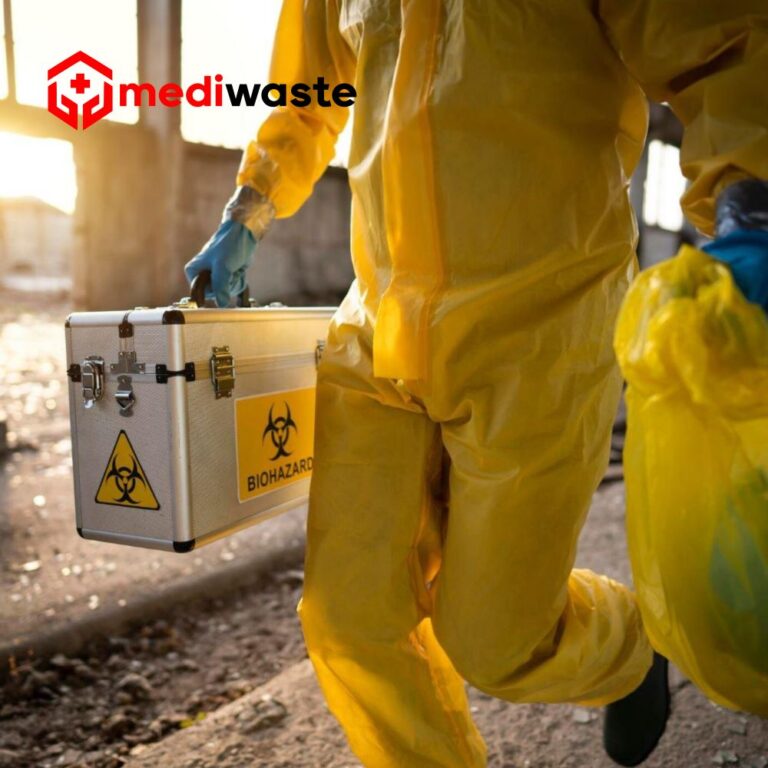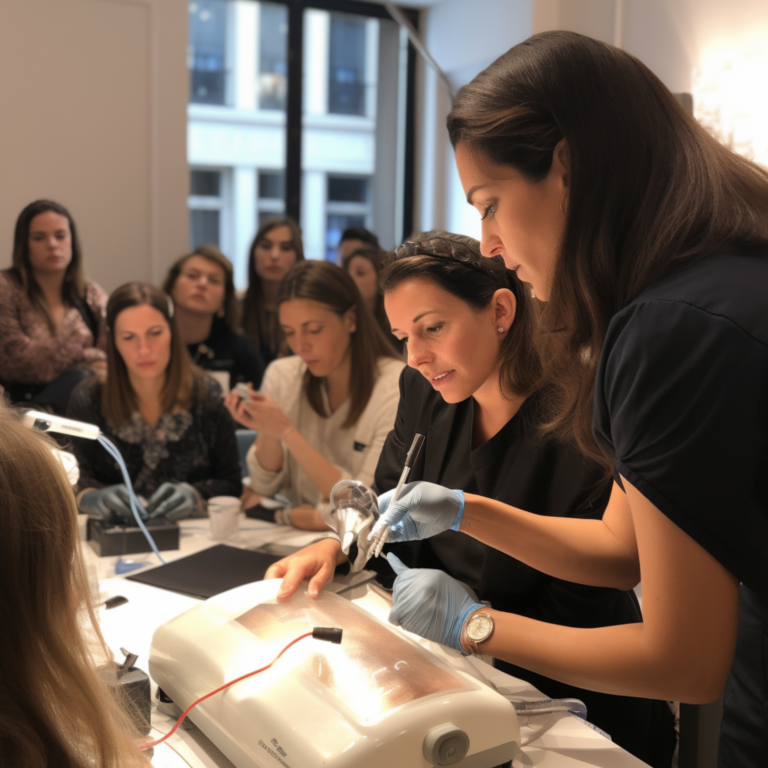Compliance Guide: Medical Waste Regulations for Cosmetic Surgery Facilities
Cosmetic surgery facilities generate various types of medical waste that require proper management and disposal to ensure compliance with regulations, protect public health, and safeguard the environment. This comprehensive guide outlines the key regulations and best practices for medical waste management in cosmetic surgery settings.

Understanding Medical Waste in Cosmetic Surgery
Cosmetic surgery facilities produce several types of medical waste, including:
- Sharps waste (needles, scalpels)
- Infectious waste (blood-soaked materials)
- Pharmaceutical waste (expired medications)
- Chemical waste (disinfectants, solvents)
- General healthcare waste (non-contaminated items)
MediWaste, the leading provider of medical waste management solutions, emphasizes the importance of proper waste segregation at the point of generation to ensure compliance and minimize environmental impact.
Key Regulations Governing Medical Waste in Cosmetic Surgery
1. Environmental Protection Act 1990
This act introduces the concept of “Duty of Care,” making waste producers responsible for the proper management of their waste. Key requirements include:
- Documenting waste transfers
- Ensuring waste is handled by licensed carriers
- Preventing unauthorized disposal
2. Hazardous Waste Regulations 2005
These regulations outline the classification, handling, and disposal of hazardous wastes, including many types of medical waste. Cosmetic surgery facilities must:
- Correctly identify and classify hazardous waste
- Use authorized waste carriers for disposal
- Maintain detailed records of hazardous waste production and disposal
3. Control of Substances Hazardous to Health Regulations 2002 (COSHH)
COSHH requires employers to control substances that are hazardous to health, including many chemicals and biological agents found in medical waste. Cosmetic surgery facilities must:
- Assess the risks of hazardous substances
- Implement control measures to prevent or reduce exposure
- Provide staff training on handling hazardous substances
MediWaste offers comprehensive COSHH compliance services, including risk assessments and staff training programs tailored to cosmetic surgery settings.
4. Health and Safety (Sharp Instruments in Healthcare) Regulations 2013
These regulations aim to prevent injuries and infections from sharp medical instruments. Key requirements include:
- Using safer sharps where reasonably practicable
- Providing secure, clearly marked containers for sharps disposal
- Implementing safe systems of work for using and disposing of sharps
5. Controlled Waste (England and Wales) Regulations 2012
These regulations define clinical waste and outline its proper management. Cosmetic surgery facilities must ensure that:
- Clinical waste is segregated from other waste streams
- Appropriate containers are used for different types of clinical waste
- Waste is collected by a licensed waste carrier
Best Practices for Medical Waste Management in Cosmetic Surgery Facilities
1. Waste Segregation
Proper waste segregation is crucial for compliance and cost-effective waste management. Implement a color-coded system for different waste types:
- Yellow: Highly infectious waste
- Orange: Infectious waste suitable for alternative treatments
- Purple: Cytotoxic and cytostatic waste
- Blue: Medicinal waste
- Black: General (non-hazardous) waste
MediWaste provides color-coded containers and clear labelling systems to facilitate proper waste segregation in cosmetic surgery facilities.
2. Staff Training
Comprehensive staff training is essential for ensuring compliance with waste regulations. Training should cover:
- Waste classification and segregation
- Proper handling and disposal procedures
- Health and safety considerations
- Regulatory requirements and facility policies
Regular refresher courses should be provided to maintain awareness and compliance.
3. Waste Minimization
Implement strategies to reduce waste generation:
- Use reusable items where possible (e.g., sterilizable instruments)
- Optimize inventory management to reduce expired products
- Consider alternative treatments that produce less waste
4. Proper Storage and Handling
Ensure that medical waste is stored and handled safely:
- Use appropriate containers for different waste types
- Store waste in a secure, designated area
- Regularly inspect storage areas for compliance
- Implement proper handling procedures to minimize risk of injury or exposure
MediWaste offers guidance on setting up compliant waste storage areas and developing safe handling protocols.
5. Documentation and Record-Keeping
Maintain thorough records of waste management activities:
- Waste transfer notes for each collection
- Consignment notes for hazardous waste
- Training records for staff
- Waste audits and compliance checks
6. Regular Audits and Compliance Checks
Conduct regular audits of waste management practices to ensure ongoing compliance:
- Review waste segregation practices
- Check storage areas for compliance
- Verify documentation and record-keeping
- Identify areas for improvement
MediWaste provides professional audit services to help cosmetic surgery facilities maintain compliance and optimize their waste management practices.
Common Compliance Challenges in Cosmetic Surgery Facilities
1. Misclassification of Waste
Incorrectly classifying waste can lead to compliance issues and increased disposal costs. Ensure staff are well-trained in waste classification and provide clear guidelines for common waste types generated in cosmetic surgery procedures.
2. Improper Sharps Management
Sharps injuries pose a significant risk in cosmetic surgery settings. Implement robust sharps management protocols, including:
- Using safety-engineered devices where possible
- Providing easily accessible sharps containers
- Training staff on safe handling and disposal procedures
3. Pharmaceutical Waste Handling
Proper disposal of expired or unused medications is crucial. Implement a system for identifying and segregating pharmaceutical waste, and ensure it is disposed of through appropriate channels.
4. Managing Chemical Waste
Cosmetic surgery facilities often use various chemicals that require special handling and disposal. Develop clear protocols for managing chemical waste, including proper storage, labelling, and disposal methods. MediWaste offers specialized services for the safe disposal of chemical waste generated in cosmetic surgery settings.
Emerging Trends in Medical Waste Management
1. Sustainable Disposal Methods
As environmental concerns grow, there’s an increasing focus on sustainable waste disposal methods. Consider partnering with waste management providers that offer:
- Recycling programs for eligible waste streams
- Energy recovery from waste incineration
- Alternative treatment technologies with lower environmental impact
2. Digital Waste Tracking Systems
Digital platforms for tracking waste from generation to disposal are becoming more prevalent. These systems can help:
- Improve compliance by ensuring proper documentation
- Optimize waste management processes
- Provide real-time data for reporting and decision-making
MediWaste offers advanced digital waste tracking solutions tailored to the needs of cosmetic surgery facilities.
3. On-Site Treatment Technologies
Some facilities are exploring on-site treatment options for certain waste streams. While these technologies can reduce transportation needs and associated costs, they require careful consideration of regulatory requirements and operational feasibility.
Case Study: Implementing a Comprehensive Waste Management Program
A large cosmetic surgery clinic partnered with MediWaste to overhaul its waste management practices.
Key steps included:
- Conducting a thorough waste audit to identify areas for improvement
- Implementing a color-coded waste segregation system
- Providing comprehensive staff training on waste management
- Installing secure, compliant waste storage areas
- Implementing a digital waste tracking system
Results:
- 30% reduction in overall waste volume
- 25% decrease in waste management costs
- Full compliance with all relevant regulations
- Improved staff awareness and engagement in waste management
Conclusion
Compliance with medical waste regulations is crucial for cosmetic surgery facilities to ensure safety, protect the environment, and avoid potential legal and financial consequences. By implementing best practices, staying informed about regulatory requirements, and partnering with experienced waste management providers, cosmetic surgery facilities can achieve and maintain compliance while optimizing their waste management processes.
MediWaste is committed to supporting cosmetic surgery facilities in navigating the complex landscape of medical waste regulations. Our comprehensive services, expertise in regulatory compliance, and innovative waste management solutions make us an ideal partner for facilities looking to improve their waste management practices and ensure ongoing compliance.
Contact MediWaste
For expert guidance on medical waste compliance and management in your cosmetic surgery facility, contact MediWaste today. Our team of specialists can provide tailored solutions to help your facility optimize its waste management practices, ensure regulatory compliance, and minimize environmental impact.
Whether you’re looking to improve your current waste management program or implement a comprehensive new system, MediWaste has the expertise and resources to support your goals. Reach out to us to schedule a consultation and take the first step towards more efficient, compliant, and sustainable medical waste management in your cosmetic surgery setting.







